Institute Profile: Haitian Studies Institute
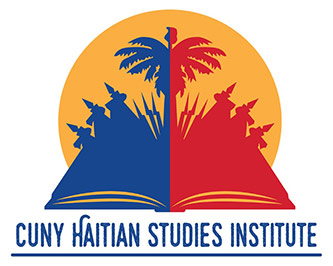
Logo of the Haitian Studies Institute
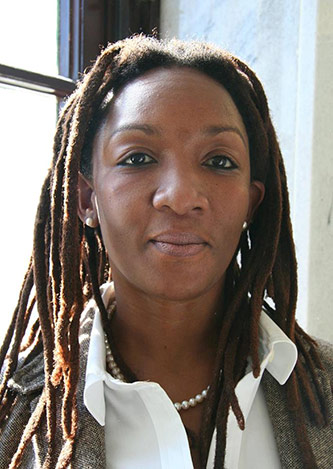
Associate Director Marie Lily Cerat
The CUNY Haitian Studies Institute (HSI) hosted by Brooklyn College, is making great strides with a new associate director and a one-million-dollar grant from the NYC Council. Associate Director Marie Lily Cerat’s new position and this generous award have come at a time of great challenges for Haiti and the Haitian Diaspora in New York. In August, Haiti suffered a 7.2 magnitude earthquake that caused major damage to the country’ southern region. More recently, thousands of Haitian migrants massed at the Texas Border after making perilous journeys of months or years in hopes of reaching the United States. At this time of crisis, and as Haiti and Haitians are facing these difficult historical moments, Dr. Cerat has picked up the reins of leadership of the Haitian Studies Institute. She is building on the work of the institute’s Founding Director, Jean Eddy Saint Paul, who stepped down in June of 2020, after a four-year tenure. Happily the new funding will help the five year old institute grow its professional staff, build a robust digital archive, initiate some important research endeavors, and provide more in-depth programming.
For many years, CUNY, Brooklyn College and community leaders agreed that a Haitian Studies Institute would be an important resource for the Haitian community. The conception of such an institute dates back to 1985 when a diverse group of CUNY students and Haitian community members approached the late Brooklyn College President Robert L. Hess about the idea of establishing a Haitian Studies program within the Brooklyn College Africana Studies Department. The concept continued to be a dream for many in the community. Over the years, and after much dedicated work from numerous constituents, as well as numerous planning committees and other iterations, the Institute formally opened its doors at Brooklyn College in April 2016.
Born in Les Cayes in southern Haiti, Cerat credits her background of growing up in a lakou, communal living system in Haiti, to her commitment to engaged community work, and can point to decades of service to Brooklyn’s Haitian community. Eleven years after immigrating to the United States, Cerat co-founded the Brooklyn-based nonprofit social organization Haitian Women for Haitian Refugees, along with Ninaj Raoul, in 1992. She pursued higher education and earned first a B.A. and then an M.A. in English and Creative Writing from City College of New York. More recently she completed her doctorate in Urban Education and was awarded a certificate in Africana Studies from the CUNY Graduate Center.
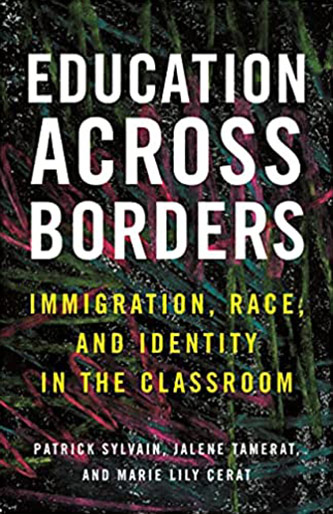
Cover of Prof. Cerat’s edited book
After many years as a teacher in the New York City public schools, Cerat joined the Brooklyn College community in 2003 as a Resource Specialist with New York’s Haitian American Bilingual ESL Technical Assistance Center, where she trained Haitian bilingual teachers and other educators to better understand the laws and regulations governing instruction for English language learners. As a staff member with HABETAC, she also helped organize numerous programs to improve the educational outcomes of Haitians in New York, including the Brooklyn College Day of the Haitian Child and several Creole language conferences. She has taught as an adjunct in the Africana Studies and Modern Languages departments offering courses in literature, Creole language and Caribbean Studies. Her chapter entitled “Tell All the Others Our Story,” has been published in her co-edited book, Across Borders: Immigration Race and Identity in the Classroom, which explores how culturally relevant pedagogy helps ensure student success.
And now leading HSI, Cerat explained, “I see this new role as an extension of what I have been doing for years. I want to help educate the public through the Institute.”
Prof. Cerat’s hard work over the years advocating for the value of Haitian Creole and the education of Haitian children is recognized by community leaders. For example, District 42 Assemblymenber, Rodneyse Bichotte-Hermelyn, a key supporter of the HSI wrote, “The CUNY world has been elevated by Dr. Cerat’s expertise as a Creolist [one who advocates for the rights of Creole-speaking communities]. She has helped our office, and many others, in translating Creole, and she has taught Caribbean history. She is a great asset, and we in the Haitian community look forward to working with her.” Cerat, in noting her commitment to the institute wrote, “I am extremely aware of the contributions of my culture to this region and the world,” and in a statement to the BC student paper, the Vanguard, she added that, “Sharing this passion and keeping others engaged were the main reasons I wanted to help lead the Institute.”
Cerat explained that there are three central pillars on which the institute was established. The first pillar is research and its dissemination. The second is policy analysis that links scholarship to social action impacting people of Haitian origin. The third includes outreach and collaboration with various organizations that serve the Haitian community. In a recent interview, Cerat stated that: “I will work tirelessly to ensure that the institute under my leadership makes progress in the three major pillars on which it stands.”
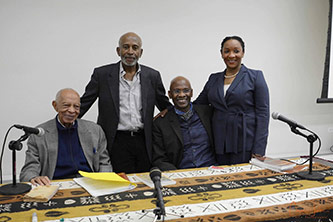
2018 Haitian Creole Language and Culture Symposium. From left to right: Father William Smarth, Menes Dejoie, Michel DeGraff and Marie Lily Cerat.
In line with the Institute’s mission to advocate for Haitian people both locally and globally, the Institute prepared a public response to the crisis of thousands of Haitian migrants at the Texas border. On September 22, the Institute released a statement demanding an end to the inhumane treatment of Haitians at the Texas border. The statement also pointed out that Haiti has been labeled as “the poorest country in the Western Hemisphere” only after centuries of economic exploitation by France, Spain, and the United States.
Under her leadership, the Haitian Studies Institute has a busy 2021-2022 academic year planned, with a set of goals and activities that are grouped under the three main categories: research, policy, and community. A major upcoming event is the annual Haitian Language and Culture Symposium scheduled for October 29-31. Among the others are two events in November, a panel, “CUNY’s Promotion of Higher Education as Humanitarian Relief in Haiti,” on the 12th, and on the 18th, the annual celebration of the Haitian Revolution, “Revisiting the Battle of Vertières: The Struggle of the Haitian People Continues.” A virtual forum on mental health in the time of COVID-19 is scheduled for May 15.
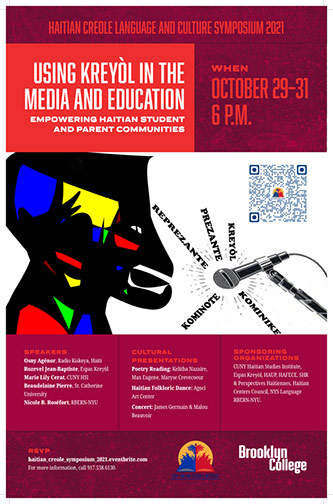
2021 Haitian Creole Language and Culture Symposium
A critical initiative research initiative for this year is a community needs-assessment survey. Prof. Cerat explained that, “I am currently preparing to conduct the HSI’s first research study project with organizational leaders to gather data about needs and services in the community that will help to better understand the challenges and aspirations of the community.” In terms of scholarship, Cerat wrote, “I envision the Institute as the site where anyone doing research on Haiti and Haitians anywhere in the world will have to consult and contact, because we will have the resources to assist them,” thus making the institute, “a flagship Haitian research space.”
In taking on her new role, she remains optimistic and passionate about the work she plans to accomplish. Cerat notes that the whole process of ushering in her leadership at HSI from the beginning to today has left her feeling very proud. She believes that the creation of and continued support for the institute are instrumental for her community’s unification. “While there’s still quite a good distance to go, the Institute makes Haitians feel less invisible, this community that has long been on the margins of our city, our society,” she wrote. The Brooklyn College HSS community congratulates Prof. Cerat on her new role and wishes her great success in leading the CUNY Haitian Studies Institute at Brooklyn College.






